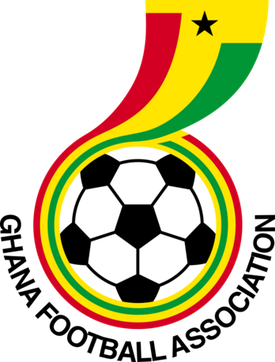Related Research Articles
There are many styles of traditional and modern music of Ghana, due to Ghana's worldwide geographic position on the African continent.

The Ghana national football team represents Ghana in men's international football. The team is named the Black Stars after the Black Star of Africa in the flag of Ghana. It is governed by the Ghana Football Association, the governing body for football in Ghana. Prior to 1957, it played as the Gold Coast.

Baffour Gyan is a Ghanaian former professional footballer who played as a striker.

Asamoah Gyan is a Ghanaian former professional footballer who played as a striker. He is a former captain of the Ghana national team.
Kwabena Joseph "Joetex" Asamoah Frimpong is a Ghanaian former professional footballer who played as a striker.
Bachatón is a fusion genre of reggaeton from Panama and Puerto Rico as well as bachata from the Dominican Republic. Bachaton combines bachata melodies and reggaeton style beats, lyrics, rapping, and disc jockeying. The word "bachatón" is a portmanteau of "bachata" and "reggaeton". "Bachatón" was coined and widely accepted in 2005. It is a subgenre of reggaeton and bachata.
Reggie Rockstone is a Ghanaian rapper. He was born in the United Kingdom but lived his early years in Kumasi and Accra. He has been living in Ghana continuously since he pioneered the Hip-Life movement in 1994. He is married to Dr. Zilla Limann, Daughter of Hilla Limann, the only president of the third Republic of Ghana. They have three kids together and have been married since 2001.

Edward Nana Poku Osei known by the showbiz name Hammer of The Last Two is a Ghanaian record producer. He is the founder and CEO of The Last Two Music Group and known for growing Ghanaian Hip Hop or Hiplife artists, including Obrafour, Tinny, Kwaw Kese, Sarkodie, Ayigbe Edem, among others. He is sometimes credited as one of the people in the popularization of Hiplife or Hip Hop made in Ghana.

Azonto is a dance and music genre from Ghana. Ghana News Agency cites their study which found out the dance is connected to the traditional Ga dance Kpanlogo, associated with the coastal towns in the country such as Chorkor, James Town, Teshie, Nungua and Tema, in the Greater Accra Region.
Kwadwo/Kwadjo/Kojo is an Akan masculine given name originating from the Akan people, meaning born on a Monday. As an Akan given name, with the Akans being a large ethnic group consisting of various tribes such as the Fante, Asante, Akuapem among others, Kwadwo/Kwadjo is sometimes written as "Kojo", Kwadwo or Kwadjo and is also used less frequently as a family name. People born on particular days are supposed to exhibit the characteristics or attributes and philosophy, associated with the days. Kwadwo has the appellation Okoto or Asera meaning peace. Thus, males named Kwodwo tend to be peaceful.

Elom Adablah, better known by his stage name E.L, is a Ghanaian Afrobeats musician, rapper, singer and producer.
"Azonto" is a song by Nigerian singer Wizkid. It was produced by the record producing and songwriting duo Legendury Beatz, and was officially released on 28 January 2012. The song helped popularize Azonto, a Ghanaian music genre and dance, and peaked at number nineteen on the Afribiz Top 100 chart. Wizkid performed "Azonto" at Chris Brown's Lagos concert, which occurred at the Eko Hotel and Suites. Chris Brown talked about the dance on 106 & Park and thanked Wizkid for teaching him.

Theophilus Tagoe, popularly known as Castro, Castro Under Fire or Castro De D’Destroyer, was a Ghanaian hiplife recording artist and musician.
Appiah Dankwah, popularly known as Appietus is a Ghanaian actor musician, music producer and sound engineer based in Accra, Ghana. The name Appietus gained prominence from his signature "Appietus in the mix". It was, however, coined from the phrase "Appiahs' Tools". He has been the winner of six music industry awards in the 10-year span from the start of his career. He won the Ghana Music Honours 2015 Best Music Producer and Sound Engineer award, Sun Shine Music Awards 2010 Best Sound Engineer award and the UK Ghana Music Awards, Best Sound Engineer in 2008. His remarkable work has also led him to represent the country in some international programs including WOMEX 2013 in Wales, UK, and Worldtronics in Berlin, Germany, 2012.
Albert Serebo Ayeh-Hanson, known by his stage name Ball J or Ball J Beat, is a Ghanaian rapper, sound engineer, record producer and entrepreneur from Accra. He spent most of his formative years in the U.S State of California. Ball J is the CEO and founder of Nu Afrika Records. He is currently signed to Platinum Management, an American record label and the brand ambassador to Roca Bella Brands.
Maradona Yeboah Adjei, also known by his stage names Guru and Gurunkz, is a Ghanaian rapper and fashion designer. He is known for his contemporary hip-hop rap style that combines English and Ghanaian indigenous languages. Guru's breakthrough was in 2011, when his hit song "Lapaz Toyota" appeared on the Ghanaian music charts.
Nana Yaw Nkrumah born in Accra, professionally known as Dr Ray Beat is a Ghanaian record producer and sound engineer, who produces music ranging from Afrobeat, Hip hop, Hiplife, Azonto, Dancehall and Afropop. He also produced for Guru, Kwaw Kese, Kofi Kinaata and more.
Joseph Kwame Addison, popularly known as KillBeatz, is a Ghanaian music producer and sound engineer. He is a member of music group R2bees and is also the CEO of Legacy Life Entertainment, which has signed the Ghanaian musician King Promise.
Afrobeats, not to be confused with Afrobeat or Afroswing, is an umbrella term to describe popular music from West Africa and the diaspora that initially developed in Nigeria, Ghana, and the UK in the 2000s and 2010s. Afrobeats is less of a style per se, and more of a descriptor for the fusion of sounds flowing out of Nigeria and Ghana. Genres such as hiplife, jùjú music, highlife, azonto music, and naija beats, among others, were amalgamated under the "Afrobeats" umbrella.
References
- 1 2 3 "Ghana Striker Asamoah Gyan To Launch Alkayida Dance At Brazil World Cup". ghanasportsonline.com. 31 March 2014. Archived from the original on 2014-04-08. Retrieved 7 April 2014.
- ↑ "Alkayida Is Not About Terrorism Guru". showbiz.peacefmonline.com. Archived from the original on 2016-03-04. Retrieved 2015-10-18.
- ↑ "Azonto or Alkayida dance for world cup". heyghana.com. 15 January 2014. Archived from the original on 8 April 2014. Retrieved 7 April 2014.
- 1 2 3 "Alkayida – boys abr3… the new dance craze". globalnewsreel.com. 16 November 2013. Retrieved 7 April 2014.